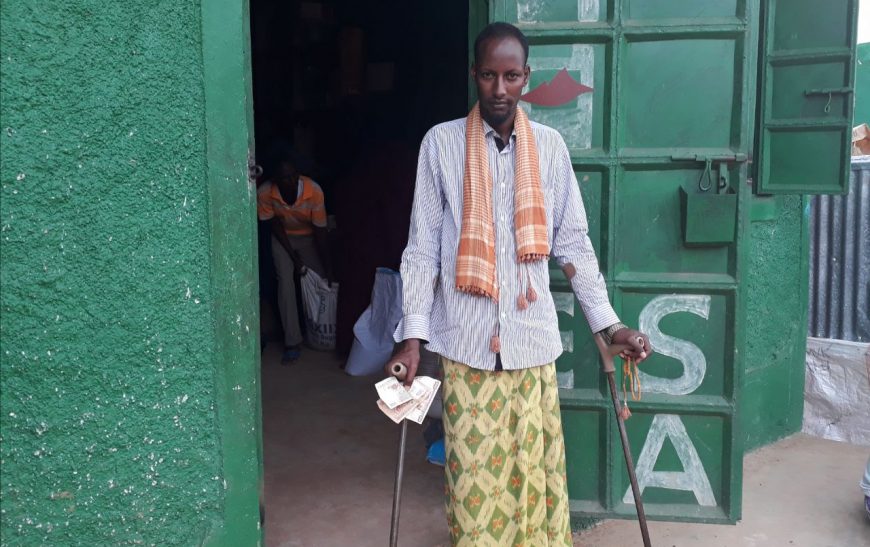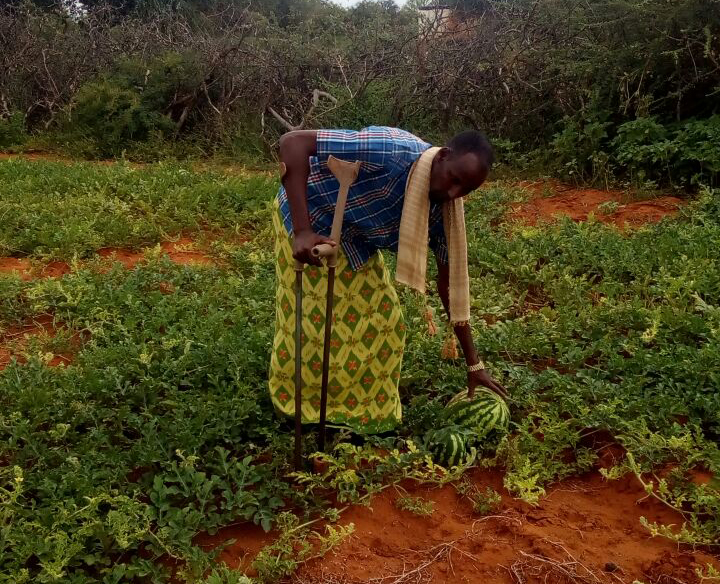Hussein’s story, a story of restored hope and dignity
The 2016-2017 devastating drought left an estimated 2.7 million people from 23 out of the total 47 counties in Kenya in need of humanitarian assistance. This led to massive loss of livestock and livelihoods, leaving more people vulnerable and at risk of food insecurity. The continuous threat of drought, floods, and conflict over resources have created a “ticking time-bomb” scenario that is exacerbated by climate change, leaving many disheartened about their futures.
Bridging the gap after devastation
Hussein knows this all too well. Living in Mandera County, Hussein solely depended on livestock to make a living. Now, life is becoming increasingly difficult due to the lack of pasture and water. His vulnerability was exacerbated by his physical impairment, which limited his ability to travel far and wide to access other forms of livelihood. After losing most of his livestock, he returned to his village where he took up a job as a dealer in the livestock market, but this was not enough to meet his family’s basic needs. As the market kept struggling and prices dropped, he was forced to stay at home and rely on relatives and well-wishers for financial support. Life was becoming more and more difficult, with a family of six depending on him for food and other essential commodities.
When the ACTED Cash Transfer programme started in Mandera County, Hussein’s household was surviving on the bare minimum, with little or no food to eat. The cash intervention came at the right time to meet the community’s most pressing needs.
The cash I received gave me confidence and the ability to purchase a balanced diet for my family.
Meeting urgent needs, investing for the future
The cash transfers allowed Hussein to feed his struggling family and to repay his debts, improving his family’s food security. Hussein was among 7,460 vulnerable persons who benefited from the cash transfer in Mandera and Samburu Counties.

According to him, the cash transfer came at a time when his household was getting poorer and poorer. Hussein managed to save some money and engaged in dry land farming in a small plot around the village as the much anticipated long rains made it a reliable venture. He used the cash to buy seedlings (maize, sorghum and watermelon) and started farming to diversify his livelihoods. The recent long rains have had great impact on the crop and livestock production and he is hopeful that this will increase their food security situation significantly.

I am very happy that ACTED was able to come to me, as people with physical impairment are often unable to access critical services because of that.
ACTED partnered with Humanity and Inclusion (HI) to ensure the beneficiary selection process was inclusive to persons with disabilities like Hussein. ACTED targeted 590 people with disabilities in both Mandera and Samburu . The Cash Transfer programme, funded by the European Commission’s Directorate-General for European Civil Protection and Humanitarian Aid Operations (ECHO), is supporting 7,460 vulnerable families in Samburu and Mandera counties to improve access to basic food and non-food needs, with the aim is to save lives through nutrition- sensitive emergency cash assistance to drought affected households in the regions.